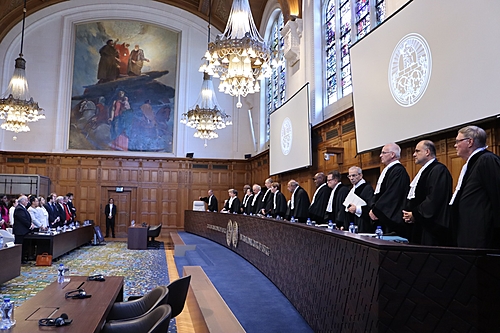
The International Court of Justice rejected this Thursday (13) Nicaragua’s petitions in a lawsuit filed by the country against Colombia in which it claimed rights on the high seas that would allow them to occupy part of the maritime space of a Colombian archipelago.
The decision was considered a “victory” by Bogotá, as the case dragged on since 2001, when Managua filed the lawsuit.
“A great victory for Colombia in The Hague. The Court did not give in to Nicaragua’s claims to expand its continental shelf. We hope, with this decision, to end the border controversy and focus on bringing sustainable development to our archipelago,” said Colombian President Gustavo Petro.
::Chomsky, Corbyn, Correa: Intellectuals and politicians from 20 countries denounce coup in Colombia::
Nicaragua, in turn, spoke through the lawyer representing the case at the Court, Carlos Argüello, and said that the country had “done well” in the process.
This is because, despite rejecting the Nicaraguan arguments, the Court did not change the judgment given in 2012, when it forced Colombia to cede almost 75,000 km² of its maritime territory to Nicaragua.
The decision of 11 years ago dates back to the process started in 2001, when the Nicaraguan government questioned the delimitations of its maritime border with Colombia. Despite the favorable ruling in 2012, the archipelago of San Andrés, Providencia and Santa Catalina remained under Colombian control.
::Colombia accuses Russia of violating war protocols after attack injures 3 Colombians in Ukraine::
That is why, in 2013, Nicaragua once again asked the Court to rectify the boundaries of its continental shelf on the high seas. However, this Thursday, the court found that the Central American country’s claims sought to exceed the limit of 200 nautical miles (about 370 km) provided for in international maritime legislation.
In a note, the Ministry of Foreign Affairs of Colombia said that the decision “closes, once and for all, a long dispute between Colombia and Nicaragua.” “Undoubtedly, it is a decision that will be transcendental for maritime spaces, it will echo in other regions where tensions have been unnecessarily created, thus avoiding conflicts that could endanger global security”, says the Chancellery.
::Venezuela suffers setback at the International Court in dispute over territory with Guyana::
This Thursday’s sentence, in fact, set a precedent for maritime border disputes, since Colombia has not ratified the United Nations Convention of the Sea, which is the document responsible for regulating the limits of continental shelves. So, the Court had to base the case on what it considers international law, on an unprecedented methodology for this type of dispute.
Editing: Thales Schmidt
Source: www.brasildefato.com.br

